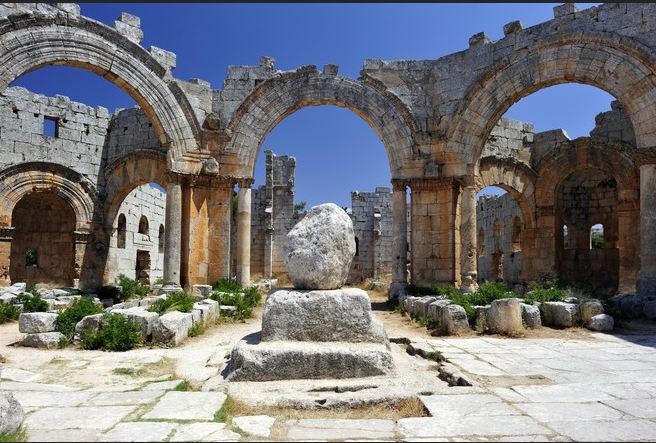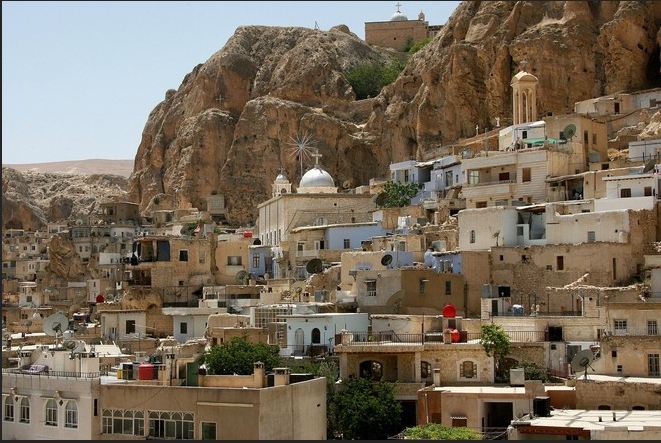Near the Syrian city of Aleppo, the Church of St. Simeon
the Stylite commemorates the 5th-century ascetic who
became an ancient sensation by living atop a tall pedestal
for decades to demonstrate his faith. Krak des Chevaliers,
an awe-inspiring castle near Homs, was a fortress for the
order of the Knights Hospitaller in their quest to defend
a crusader kingdom. Seydnaya, a towering monastery in a
town of the same name, was probably built in the time of
Justinian.
 |
| The Church of St. Simeon the Stylite commemorates the 5th-century ascetic. Photo: Getty Images. |
A
nun there spoke about Syria's current crisis from
within a candlelit alcove this week, surrounded by
thousand-year-old votive icons donated by Russian
Orthodox churchgoers and silver pendants in the shape
of body parts that supplicants have sought to
heal—feet, heads, legs, arms, even a pair of
lungs and a kidney.
"It's not a small thing we are facing," she
said, speaking as much about the country as her faith.
"We just want the killing to stop."
Few places are as central as Syria to the long history of
Christianity. Saul of Tarsus made his conversion here,
reputedly on the Street Called Straight, which still
exists in Damascus. It was in these lands that he
conducted his first missions to attract non-Jews to the
nascent faith.
A century ago, the Levant supported a population that was
perhaps 20% Christian. Now it is closer to 5%. Syria today
hosts vibrant, if dwindling, communities of various
ancient sects: Syrian Orthodox, Syrian Catholics, Greek
Orthodox, Greek Catholics and Armenian Orthodox.
But Syria's Christian communities are being severely
tested by the uprising that has racked the country for
more than a year. They think back to 636, when the
Christian Byzantine emperor Heraclius saw his army
defeated by Muslim forces south of present-day Damascus.
"Peace be with you Syria. What a beautiful land you
will be for our enemies," he lamented before fleeing
north to Antioch. In the 8th century, a famed Damascus
church was razed to make way for the Umayyad
Mosque—today one of Islam's holiest sites.
Not a few Christians in modern-day Syria worry that the
current crisis could end the same way for them if Bashar
al-Assad and his regime are defeated by the rebel
insurgency.
In many ways, it is an odd concern. Christians and Muslims
have lived side-by-side with minimal friction during the
decades of Assad family rule. Historically, local
Christian communities have sometimes even welcomed Muslim
overlords when they freed them of heavy-handed rule from
Constantinople or Rome. In many places the two groups
continue to reach out to each other even now. Even rebel
extremists say that they don't have anything against
Christians, either.
Yet as the conflict inside the country takes on
ever-stronger sectarian overtones, as Christians largely
side with the regime or at least decline to actively
oppose it, some of the oldest Christian communities on
earth are feeling squeezed.
"We have been leading a life that has been the envy
of many," says Isadore Battikha, who until 2010
served as the archbishop of Homs, Hama and Yabroud for the
Melkite Greek Catholic church. "But today fear is a
reality."
Father Battikha is among the many staunch supporters of
President Assad in the Christian church hierarchy.
From the very start of the current conflict, history and
religion have played a key role in fueling passions on
both sides in Syria. And this has become more pronounced
as the conflict dragged on, turning bloodier and more
vicious.
One of the oft-repeated assertions made by the Syrian
regime plays effectively on ancient rivalries. The
conflict, it says, is an attempt by neo-Ottomans in Turkey
and expansion-minded Muslim ultraconservatives from Saudi
Arabia—known as Wahhabis—to gain a foothold in
Syria.
This narrative, one of majority Sunni Muslims overwhelming
and dominating minorities, is now a staple of nightly news
bulletins on Syrian state television. The regime knows
well how this message resonates with Christians and other
minorities.
The Ottomans, Turks who ruled Syria from 1516 until World
War I, relegated Christians to a second-class citizen
status. They were allowed to practice their religion and
govern themselves in matters that didn't concern the
Muslims. But they were also required to pay special taxes,
and there were plenty of restrictions on them when it came
to interactions with Muslims. Wahhabism, the ascetic and
harshly conservative form of Islam practiced in Saudi
Arabia, is even tougher on Christians.
Rebels have made it easy for the regime to play on fears
such as these. In an effort to inspire their own fighters
and curry favor with foreign backers—primarily Saudi
Arabia and Qatar, the only other country where Wahhabism
is the state religion—some frame the conflict as a
struggle to restore the glories of the Islamic caliphates
and redeem Syria from the rule of the infidels.
This clearly comes through in the names adopted for the
brigades of the Free Syrian Army—the loosely linked
grouping of local militias and army defectors. Many of the
militias are named after figures revered by Sunni Muslims
like the third Caliph Umar ibn al-Khattab, whose main
title was al-Farouq, meaning "distinguisher between
truth and falsehood," and the Islamic warrior and
military commander Khalid ibn al-Walid.
It was Ibn al-Walid, fighting for the Caliph Umar, that
defeated Emperor Heraclius in 636 during the first wave of
Muslim conquest to come from the Arabian Peninsula in the
years after the death of the Prophet Muhammad.
The main target of the most sectarian-minded rebels isn't
Christians. It is the Alawites, the minority group to
which the Assad family belongs. Alawites, who make up
about 12% of Syria's population, about the same as
Christians, are a heterodox sect that branched off from
Islam. They are considered by Muslim extremists to be
heretical, far worse than Christians.
Nonetheless, many Christians fear any government that
replaces the Assad regime might be dominated by groups
like the Muslim Brotherhood that could relegate them back
to second-class status. They also worry their communities
could be devastated in the crossfire between Syria's
largely Sunni Muslim insurgency and the well-armed Alawite
regime, just as Christians in neighboring Iraq have
suffered mightily in the sectarian wars there over the
past decade.
The expansion of the conflict to Syria's two biggest
cities, Damascus and Aleppo, has amplified the fears of
the Christians. They are under pressure from both the
regime and rebels to take sides and make their allegiances
known. Those who want to avoid taking sides are leaving.
For the time being many Christians, like Muslims and other
refugees, have relocated to areas where they feel safer
within Syria or in neighboring Lebanon. So far, the
pattern in neighboring Iraq—where many Christians
have left for good to Western countries—hasn't
emerged.
The clearest examples of Christians taking the side of the
regime have been in Homs. In the town of Qusayr, southwest
of Homs, one Christian family helped aid the security
forces by taking up arms and manning checkpoints. The
result was a backlash against all Christians there, and
the town has largely emptied of Christians since then.
In Wadi al-Nasara—the Valley of Christians, another
enclave of some 30 villages west of the city of
Homs—a family of pro-regime Christians has fought
alongside Alawite loyalists, say residents who recently
fled the area. Pro-regime Christians commandeered two
palaces in the scenic valley that are owned by Gulf Arab
diplomats, they said.
Nearby, Sunni fighters have made a base in the landmark
12th-century Crusader-era castle Krak des Chevaliers.
"It is now impossible for a Muslim to come down to
the valley," said a resident of the area.
Father Paulo Dall'Oglio, an Italian Jesuit priest who
lived in Syria for three decades but was expelled by the
regime in June, says many members of the church have
long-standing ties with the regime and intelligence
services that have shaped their stance.
 |
| A general view of the Christian Syrian village of Maalula, 60 kms north of Damascus. Maalula is one of the last corners in the world where its residents still speak Aramaic, the mother tongue of Jesus Christ. Photo: Getty Images. |
"Many
Christians in Syria believe that there's no alternative
to the Bashar Assad regime," says Father
Dall'Oglio.
Some Christians, though, are striving to bridge that
divide, attempting to reach out to the opposition and
rebels, or at least cross the sectarian gulf that
increasingly separates them.
Basilios Nassar, a Greek Orthodox priest from the central
city of Hama, was shot and killed by government snipers in
January while he was helping evacuate the wounded in
clashes in one neighborhood, Christian activists say.
They say the snipers probably mistook him for an Islamist
fighter because of his beard and black robes. His church
said he was killed by "an armed terrorist
group."
Caroline, a Christian activist who asked to be identified
by only her first name, was arrested by security forces in
April in Damascus while distributing chocolate Easter eggs
to the children of Christian, Sunni and Alawite families
displaced by the fighting in Homs.
Paper strips bearing passages from the Quran and the Bible
were attached to the eggs. Caroline said this act was part
of her attempts to chip away at the barriers now
separating Syria's religious groups because of the
conflict.
Previously she made it a point to assist the wives and
children of men killed in fighting in the predominantly
Sunni town of Douma outside Damascus, handing out food
provisions and cash envelopes.
She had also sought meetings with church leaders to ask
them "not to impose one position on all
Christians." She said the majority either scolded her
for being against the regime or refused to meet with her.
Father Nawras Sammour, a 44-year-old Jesuit from Aleppo,
runs a nationwide relief program known as Jesuit Refugee
Services. The group is currently providing assistance to
6,000 Syrian families across the country who are displaced
by the violence—Sunni and Shiite Muslims, Druze,
Alawite as well as Christian.
He believes only by reaching out across religious divides
will Christians continue to be a vibrant presence in these
ancient lands. He recognizes the challenges, and says he
understands Christian concerns.
"Look at Iraq, look at Egypt," he says, listing
neighboring countries where political upheaval and the
replacement of an authoritarian ruler with an Islamist
resurgence has pummeled long-standing Christian
communities. "But despite this we have to build
bridges. These are the principles of the gospel. We can't
just pick a side and go with them."
Alexander Haddad, a 66-year-old resident of the mountain
hamlet of Maalula, is concerned about the fate of his
ancient Christian community, but he takes the long view.
Like other residents of the town, he speaks a variant of
Aramaic, the language used by Jesus himself.
"A lot of people have passed through this
country—the Byzantines, the Muslims, Tamerlane, the
Mongols, the Ottomans," said Mr. Haddad, seated in
the shadow of the convent of St. Thekla, the feminine hero
of the biblical legend, the Acts of Paul and Thekla.
"Jesus was from just to the south. St. Paul came to
Maalula," he says. "Christianity is very strong
here."




















